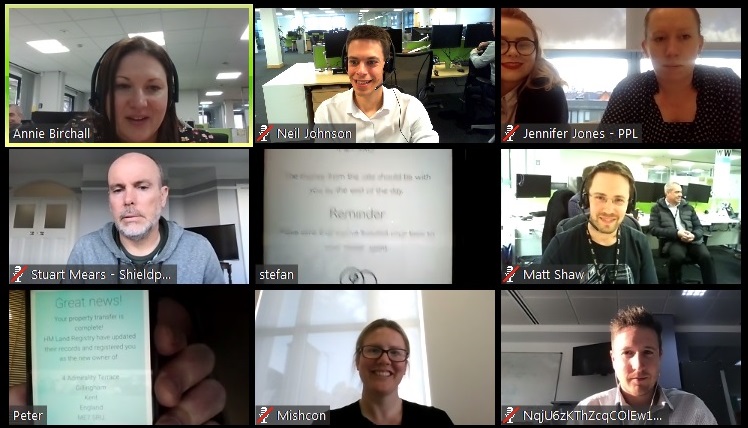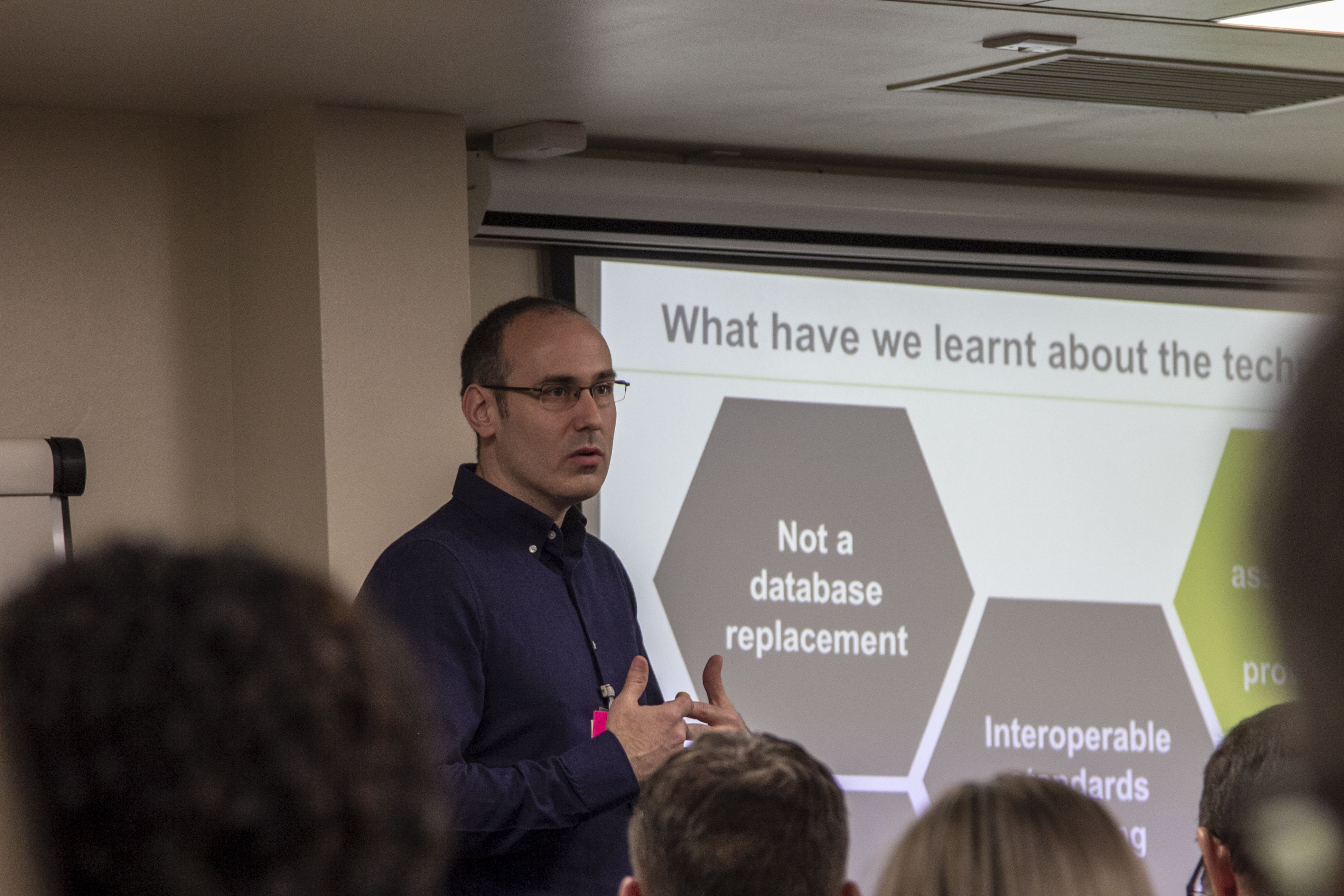
If you’ve ever bought or sold a property you will know that it can take a long time. There are a number of reasons for this. Some delays are avoidable and some are inevitable. With so many people involved in the process, it is often difficult for the buyer and seller to know what is happening at each stage.
Our ambition at HM Land Registry is to become the world’s leading land registry for speed, simplicity and an open approach to data. Our Digital Street research project enables us to explore how we can use technology to make processes such as buying and selling property simpler, faster and cheaper.
Why are we looking at blockchain?
This year in Digital Street we set out to build a prototype that would enable a digital transfer of a property that automatically updates the Land Register. We were keen to test the use of blockchain technology in a digital transfer and therefore developed the prototype using the Corda platform.
To demonstrate the benefits of a fully distributed network, we worked with leading conveyancing firms Mishcon de Reya and MyHomeMove, payment intermediary Shieldpay, digital identity provider Yoti and HM Revenue & Customs to build an end-to-end proof of concept. We also created a simple mobile interface for the buyer and seller so they could complete their actions on their mobile phones, such as verifying their identity and signing their agreements. All we needed then was a real life property transaction to test the prototype.
The first digital transfer
On 6 March 2019 the sale of a recently refurbished, semi-detached house in Gillingham had completed. It had taken 22 weeks, much longer than the six weeks the buyer and seller had expected. In early April we sat down with all the parties involved to see how much time it would take to run the sale and purchase through our blockchain prototype.
We used a video chat to bring everyone together. The buyer, Peter, was at work in Medway and his conveyancer was in Manchester. The seller, Stefan, was in his partner’s home in Gravesend and his conveyancer was in central London. The Digital Street team were in Plymouth, with representatives from Yoti in London and Shieldpay calling in from Malaga, Spain. Once each action had completed (such as drafting the sales agreement) the application automatically informed the next party it was their turn to act. The demonstration of the technology ran through, end to end, in less than 10 minutes.

The technology behind the transfer
By using blockchain technology, each party was able to see a current view of the transaction, any historical actions that had been taken, and actions that still need to take place before the transaction was complete.
By holding definitive and permanent records of a property transaction in the open, with each stage of the transfer recorded for all parties to see, there is no confusion on who needs to act next.
By using smart contracts, we enable automation across the transaction including the transfer of funds and updating the Land Register (we used a copy of the Land Register for the test).
Overall this test was a success and we believe that blockchain technology could enable:
- speedier property transactions
- more trust in the transaction
- higher levels of security
- increased transparency for participants in the transaction
Working with partners across the industry
We have learned a lot of valuable things by working with people from across the property market.
We found that the industry is open to innovation. Building a collaborative community with the industry has been incredibly valuable. We cannot fix the problems the industry faces alone, and it therefore needs to be a collaborative effort.

While we have seen a real appetite for technologies such as smart contracts, it is all still very new and we want to explore all the different models and technology providers available. Whatever the future holds, we want to ensure HM Land Registry’s data is structured in a way that can support any model or platform the industry might move to in the future.
Throughout Year 2, the community has grown and strengthened, and we’d like to invite anyone who is interested in our work to get involved. You can do so by completing this short sign-up form.
We are really excited about continuing to work with the industry to see how we can influence fundamental change in the future.
13 comments
Comment by Stephen posted on
Why is Blockchain significant in this?
Why not just evolve existing HMLR secure web applications to share information between parties?
Comment by AdamH posted on
Stephen - We're not saying that Blockchain is the answer, we have explored it to have a better understanding of the potential value that this new and emerging technology could bring to the buy/sell process. With a traditional web service, you have to keep requesting the data to ensure consistency, whereas with a blockchain the data consistency is assured by consensus of all participants.
Comment by James posted on
It will provide a significant security advantage to having the information on consensus on a distributed ledger making it immutable. There can be no central point of failure! Should a hacker gain access to a central database.. havoc can be wreaked.
For the consumer, they have permanent access to their information and can choose who to share that verified information with (Insurance, Planning, Legal). Should the information ever be revoked then all those with access to the information will see it has been revoked. Completely accessible, accountable & transparent.
Comment by Joel Lewis posted on
How does the money move between buyers/sellers bank, does the transaction also take place using blockchain technology? Moving such a large amount of money traditionaly takes alot longer than 10 minutes.
Comment by Wilf posted on
You could have used any number of databases. You don't need a blockchain when only a small number of trusted parties writing to it.
Comment by Mike posted on
A solution for this already exists in Digibyte, it just needs to harnessed and utilised.
It's hardened and mature, probably far better than deleloping you own blockchat.
Comment by Grandeo posted on
Databases are based around one super admin who controls the database. Blockchain has many owners hence reduces hack risk.
We have already put the open land registry on blockchain using linux hyperledger. It was very easy.
Comment by A Dhar posted on
The real reason we should be accelerating UK resi-market transactions on Blockchain is to unlock stamp evasion. Offshore companies that buy UK property pay stamp initially, after which that offshore entity is bought and sold repeatedly with no revenue to HMRC.
Ultimately, transparency and tax avoidance is the carrot but we could also explore fractal ownership of UK residential property - help people get on the property ladder (once tokenised). By no means suggesting this is phase 1 or 2, but it should be an ambition.
Comment by Richard posted on
Congratulations to all in this effort to streamline the transfer process and I feel that HMLR should be seriously congratulated for such forward thinking and actually running a proof of concept in this way. Very exciting to see this. The simplification of the process using smart contracts is the way to go but the greatest opportunity for the public will be in mobility and liquidity through STOs and all the fantastic opportunities that will bring for people and not just those who have traditionally profited from cumbersome processes. Fantastic! Well done!
Comment by Martin posted on
As Self Sovereign Identity solutions take hold, the realisation that blockchain is not required will become apparent. Blockchain is just a "secure" index of intentions/decisions - the actual real information has to be stored elsewhere on servers anyway that the blockchain index points to.
Comment by Nitin Kanade posted on
The self sovereign identity is a blockchain technology based solution. It has myriad uses. Once it is built, it can be used by the parties in the property related transactions to exchange only the data needed to complete the transaction. It would also expedite the process significantly. At present both the sellers and buyers wait for long time and have to rely on the information from the intermediaries. Many intermediaries are inefficient and delays introduced by them start creating doubts in sellers and buyer's minds. The two blockchains-that of identity and land registry can be made interoperative to create efficiencies and reduce cost of the transaction. The current costs are pretty high.
Comment by Sean Saunders posted on
I am executor to my brother Kevin who died last May leaving me to deal with selling his house. When Kevin originally bought the house it was under a shared ownership scheme so his share of the property was leasehold. He then bought the remainder of the house in 2006 and the house should have reverted to freehold. However his solicitor failed to send in the TP1 form so the property is still registered as leasehold. We have an agreement from the freeholder to change the title to freehold and we now have a buyer lined up. The buyer (and or their solicitor) is insisting that the title is first changed to freehold before they will exchange, rather than my solicitors suggestion to do both processes in one application (similar to extending the lease of a flat for a new buyer). Will this process (getting the title changed first) be considered for expediting and how long is it likely to take?
Comment by AdamH posted on
Sean - if the solicitor submits the application they can then request expedition https://www.gov.uk/guidance/coronavirus-covid-19-impact-on-hm-land-registrys-services#expedite-an-application
If it’s expedited then it should be considered within a few working days normally. Everyth8ng then hinges on it being in order of course